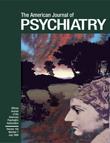Risperidone and Clozapine for Treatment-Resistant Schizophrenia
To the Editor: We read with interest the recent report by G. Bondolfi, M.D., and colleagues in which the efficacy of risperidone and clozapine in the treatment of schizophrenia was compared in a randomized, double-blind study. However, we have concerns regarding the methodology of this study. In the first place, the size of the treatment-refractory group is unclear. Two 4-week trials with unspecified antipsychotic doses are inadequate for the selection of treatment-refractory subjects, and the retrospective nature of this assessment further limits its usefulness. Indeed, the landmark study by Kane and colleagues that established clozapine’s superiority in the treatment of refractory schizophrenia deems patients treatment refractory only after 6 weeks of prospective treatment with adequate antipsychotic doses and only after three previous unsuccessful antipsychotic trials. The difficulty in effectively selecting a substantial number of treatment-refractory patients is borne out in the report’s results: 65% to 67% response rates after 8 weeks of treatment are consistent with treatment response in an unselected, rather than a treatment-refractory, group. In the Kane et al. study, only 30% of the patients responded after 6 weeks. Second, clozapine dosing appears to have been rather conservative, given that mean concentrations in the nonresponder group were 292 ng/ml. There is evidence that treatment-refractory patients may need concentrations over 350 ng/ml (1) in order to derive benefit from clozapine treatment. Thus, more patients may have responded to clozapine had they been given higher doses. Third, it has been suggested that response to clozapine may be delayed 6 months or longer after a therapeutic dose is achieved (2). Therefore, a longer observation period may have yielded further responses to clozapine treatment of potential significance for this study, especially had the dose been titrated upward in unimproved patients.
We agree with the authors that long-term, comparative trials between risperidone and clozapine, as well as olanzapine and quetiapine, in more homogeneous patient groups are needed. We also think that the previously mentioned limitations to their study preclude extending their conclusions to treatment-refractory schizophrenic patients. Definitive trials are needed to establish risperidone’s efficacy with treatment-refractory schizophrenia.
1. Perry PJ, Miller DD, Arndt SV, Cadoret RJ: Clozapine and norclozapine plasma concentrations and clinical response of treatment-refractory schizophrenic patients. Am J Psychiatry 1991; 148:231–235Link, Google Scholar
2. Lieberman JA, Safferman AZ, Pollack S, Szymanski S, Johns C, Howard A, Kronig M, Bookstein P, Kane JM: Clinical effects of clozapine in chronic schizophrenia: response to treatment and predictors of outcome. Am J Psychiatry 1994; 151:1744–1752Google Scholar



